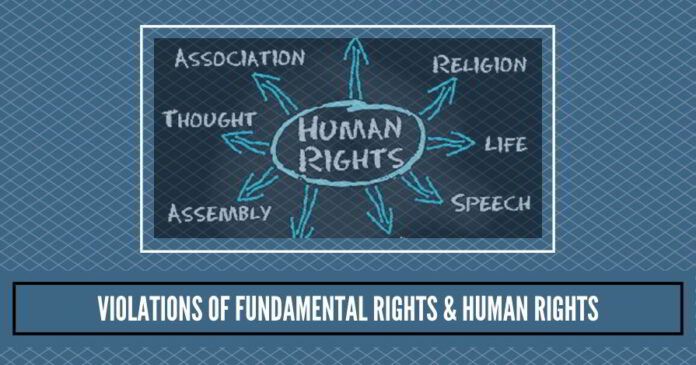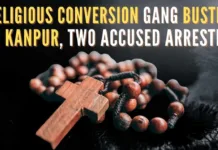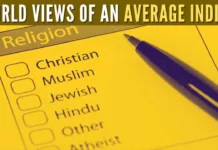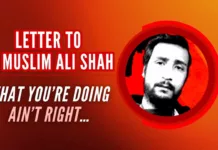
The exclusivist systems themselves violate the Fundamental Rights to equality, freedom of conscience, religion, free speech and expression.
This article studies the constitutionality or otherwise of exclusivist systems with respect to certain Fundamental Rights – Article 25, the right to Freedom of conscience and religion, and Articles 14, 15(1) on equality and non-discrimination. At the outset the relevant articles are quoted below from the Constitution of India for information:
It is clear that the Fundamental rights are given to the person, the citizen, to be exercised by him/her-self only.
- The State shall not deny to any person equality before the law or the equal protection of the laws within the territory of India.
- (1) The State shall not discriminate against any citizen on grounds only of religion, race, caste, sex, place of birth or any of them.
- (1) All citizens shall have the right—
(a) to freedom of speech and expression;
- (1) Subject to public order, morality and health and to the other provisions of this Part, all persons are equally entitled to freedom of conscience and the right freely to profess, practice and propagate religion.
It is clear that the Fundamental rights are given to the person, the citizen, to be exercised by him/her-self only.
Observe that the exclusivist systems themselves deny the right to freedom of belief, conscience and religion to their own followers because the belief is mandatory and prescribed.
Furthermore, in Rev Stanislaus v/s State of Madhya Pradesh & Ors(17 Jan 1977), a 5 Judge Constitutional Bench of the Supreme Court of India held that the right to propagate religion does not include the right to convert the other person into one’s own religion.
In other words, the right u/25(1) is an “outgoing’’ right/choice vested purely in the self, not an “in-pulling” right exercised by some entity over another person/citizen.
However, certain entities or systems claim to have the “right to convert” another as part of their core religious beliefs and obligations, in particular, the exclusivist proselytising systems (e.g. various denominations of Christianity and Islam).
Hence it is necessary to examine the constitutionality or otherwise of such systems themselves, or of their adherents/followers making such a claim based on these systems.
Observe that the exclusivist systems themselves deny the right to freedom of belief, conscience and religion to their own followers because the belief is mandatory and prescribed. Doubting or querying the belief or the “true god” or being at variance from the mandatory and prescribed system is not permissible and is a punishable offence, depending on the nature of the infraction, both in this world and the next. Once a person is inside the system, there is no freedom to move out, as a matter of principle. Atheists are not allowed in the system. Such transgressions may invite the death penalty, also implemented by such systems. Other transgressions may render a person “munafiq”, “member, not in good standing” or liable to excommunication or other punishment.
The exclusivist systems deny the right to freedom of belief, conscience and religion to others, who are not adherents to their system, or particular denomination, variously called infidel, heathen or kafir, because their particular version of the system, or “the exclusive truth”, is mandatory for all and the other must necessarily be eliminated because they exist as such.
If the state were to recognise or admit such a system, then the state itself would abet the destruction of and deny the fundamental right to equality and non-discrimination of the citizen .
Hence, exclusivist systems deny the right to freedom of conscience and religion vide Artice 25 (1) to both their own followers and to the others, to all of humanity. Since the exclusivist systems themselves deny the fundamental right to conscience and religion to all, therefore they are not admissible, are ultra vires of the constitution and also anti-constitutional. Furthermore, recognising such a system itself will be violative of the basic structure of the constitution which is not permissible vide the Keshavan and Bharati case.
Since the exclusivist – nihilist systems themselves are ultra vires of the constitution of India and anti-constitutional, the question of converting into such a system does not arise and is not permissible at all. Moreover, observe that conversion activity is aimed at destroying the right to freedom of conscience and religion, by bringing one into a system which itself abrogates the freedom, a characteristic of exclusivist systems as seen above. Hence they violate Article 30 of the UDHR as well – which denies any group or person the right to perform any activity aimed at the destruction of the right to freedom of conscience and religion.
Also note that inequality in the exclusivist –nihilist system is fundamental, pre-ordained and permanent. The owners of the exclusive truth, the followers of the true God, those who are going to heaven can never be equal to those marked for elimination, are false, illegal or outlaws going to hell – the kafir, infidel or heathen, whose god is also false. The entire system, the rights and privileges, the (“divine”) Law, are intrinsically unequal in the exclusivist system between the believer in the particular denomination and the other, even though they may be from a similar denomination or the worst of the infidels, but still going to hell. This is purely on religious grounds, because the others exist as such, as per the exclusivist system. As observed above, this is the Law, mandatory, for all to implement and obey.
Hence, exclusivist-nihilist systems violate the fundamental right to equality. Therefore, if the state were to recognise or admit such a system, then the state itself would abet the destruction of and deny the fundamental right to equality and non-discrimination of the citizen under article 14 and 15(1) above, in addition to Article 7 of UDHR, against incitement to discrimination.
It is clear that such systems violate the Universal Declaration of Human Rights
Article1.
All human beings are born free and equal in dignity and rights. They are endowed with reason and conscience and should act towards one another in a spirit of brotherhood.
Violations: Guilty of the original sin, damned, who can at best be saved; kafir, infidel or heathen, to be eliminated, obey the divine law rather than follow reason and conscience
Article2.
Everyone is entitled to all the rights and freedoms set forth in this Declaration, without distinction of any kind, such as race, colour, sex, language, religion, political or another opinion, national or social origin, property, birth or another status.
Violations: Infidels do not have the same rights and privileges as a believer, discrimination & persecution
Article7.
All are equal before the law and are entitled without any discrimination to equal protection of the law. All are entitled to equal protection against any discrimination in violation of this Declaration and against any incitement to such discrimination.
Violations: Infidels cannot be equal in any way and are discriminated against, persecuted, necessarily to be eliminated
Article18
Everyone has the right to freedom of thought, conscience and religion; this right includes freedom to change his religion or belief, and freedom, either alone or in community with others and in public or private, to manifest his religion or belief in teaching, practice, worship and observance.
Violations: Denied to both followers (believers) and infidels, cannot change/leave the system, have to obey mandatory & prescribed tenets, irrespective of conscience
Article19
Everyone has the right to freedom of opinion and expression; this right includes freedom to hold opinions without interference and to seek, receive and impart information and ideas through any media and regardless of frontiers.
Violations: Heresy and blasphemy may happen in the head or even in a privately expressed doubt, query or harmless expression per se, at variance with the prescribed, mandatory, doctrine/dogma
Article30
Nothing in this Declaration may be interpreted as implying for any State, group or person any right to engage in any activity or to perform any act aimed at the destruction of any of the rights and freedoms set forth herein.
Violations: Propagation and proselytising activity, which seeks to convert into a system that itself abrogates/destroys the right to freedom of conscience, religion and equality.
I do not want to go into details, but everybody will admit that the attitude of the minorities has not been at all helpful. – HC Mookherjee
As regards the right to Freedom of Speech & Expression, the exclusivist systems are fundamentally and qualitatively different. An offence may take place ‘inside the head’, at the level of belief itself, if one even doubts or denies a prescribed core tenet of the belief system. For example, if one even thinks that ghosts, angels or god might not exist, then it is a disqualification and an offence. Moreover, even a private expression of something at variance with the prescribed tenet, or queries, doubts may constitute an offence, which is punishable in this world and the next. For example, even a flattering portraiture of the prophet may be considered a penal offence. Furthermore, it is not necessary that there is a likelihood of hate or threat or public disorder for such a deviation from the mandatory, prescribed tenet to be an offence, the deviation per se constitutes the offence. Atheists/Apostates are punishable by death in Islam. Offences may be considered as acts of heresy or blasphemy, which is fundamentally different from the restrictions on free speech placed in open societies. Moreover, blasphemy and heresy occur in a system which is pre-ordained, a ‘divine law’ and not subject to human reason, limitation or amendment, unlike ‘man-made’ laws. Since the exclusivist systems claim to contain all the truths and offer the only and all of the solutions, coupled with the severe and fundamental restrictions on belief, speech and expression, with per se deviations from the mandatory prescription comprising penal offences, they are in the nature of totalitarian and fascist systems, completely incomparable with restrictions on speech and expression otherwise. In open societies, there are no restrictions on belief or conscience at all. Hence the exclusivist systems violate Article 19(1)(a) of the constitution of India and Article 19 of the UDHR, as they stand, in a most fundamental manner.
Furthermore, observe that the concepts of original sin, being guilty who can at best be saved, vicarious redemption, being considered sheep or slaves (without their right to belief, conscience, free speech and expression) are at variance with and violate articles 6, 8, 10, 11, 28,29 of the UDHR. The concept of grace, where purely the belief is sufficient to earn the rewards independent of the merits of any action, is also at variance with these articles. Note that these are fundamental features of the exclusivist system and are intricately woven into it.
In this regard, it may be recalled what the members of the of the Constituent Assembly stated on the record in the Constituent Assembly debates. (details in the Annexure; will be continued in the next article)
The Chairman of the Drafting Committee of the Constitution of India, Dr BR Ambedkar stated that
“… unfortunately the religions which prevail in this country are not merely non-social; so far as their mutual relations are concerned, they are anti-social, one religion claiming that its teachings constitute the only right path for salvation, that all other religions are wrong.”
Mr Tajamul Husain, a Muslim representative from Bihar stated that
“…there is no minority in this country. I do not consider myself a minority. In a secular State, there is no such thing as the minority. I have got the same rights, status and obligations as anybody else.
“If you start propagating religion in this country, you will become a nuisance to others. So far it has become a nuisance.”
Mr HC Mookherjee, a Christian, who was the Chairman of the Minority Rights Sub-Committee of the Drafting Committee of the Constituent Assembly stated that
”… The first is: are we really honest when we say that we are seeking to establish a secular state? And the second is, whether we intend to have one nation. if our idea is to have a secular state it follows inevitably that we cannot afford to recognise minorities based upon the religion. This to my mind is the strongest possible argument why reservation of seats for religious groups should be abolished and that immediately.
I do not want to go into details, but everybody will admit that the attitude of the minorities has not been at all helpful. Let us recollect how many times we used back-door influence in order to sabotage our nationalist movement. ”
From the foregoing account, it is clear that members (including Christian and Muslim) of the Constituent Assembly on record, were full of the destructive nature of (religious) ‘minorities’, in addition to the dishonest claims about secularism, and stood for equality of citizens.
The exclusivist systems themselves violate the Fundamental Rights to equality, freedom of conscience, religion, free speech and expression as enshrined in the Constitution of India and the Universal Declaration of Human Rights. They are anti-constitutional and ultra-vires of the Constitution of India.
A recall of what the members of the of the Constituent Assembly stated on the record in the Constituent Assembly debates will be continued in the Annexure in the continuation of this article.
References:
https://www.mea.gov.in/Images/attach/amb/Volume_08.pdf
https://www.newslaundry.com/2017/04/14/ambedkar-on-islam-the-story-that-must-not-be-told
https://www.quora.com/What-were-Dr-Ambedkars-views-on-Islam
- On Certain Systems and their Violations – Constituent Assembly Debates – Part 2 - October 1, 2018
- On certain systems and their violations of fundamental rights and human rights - September 29, 2018










